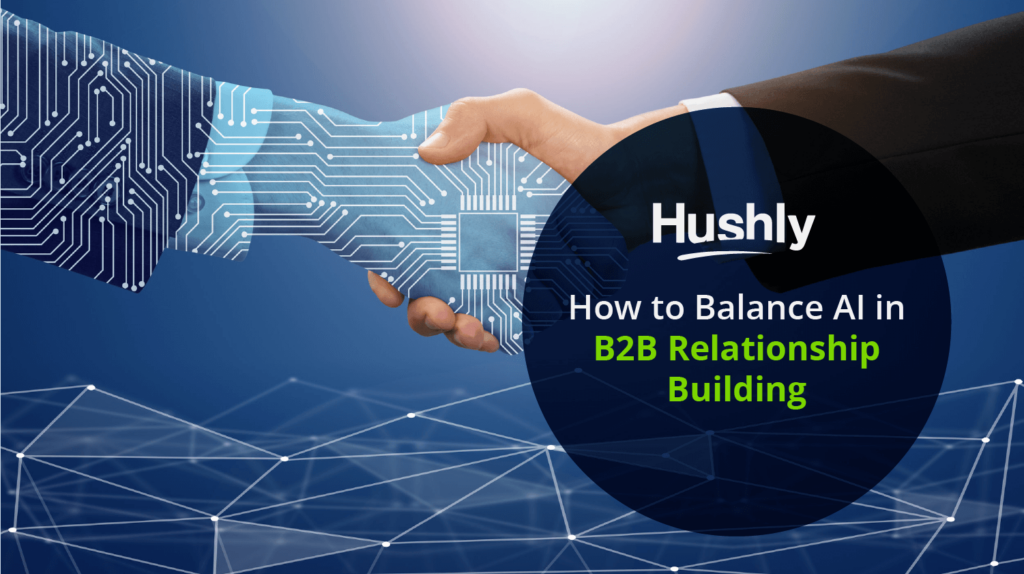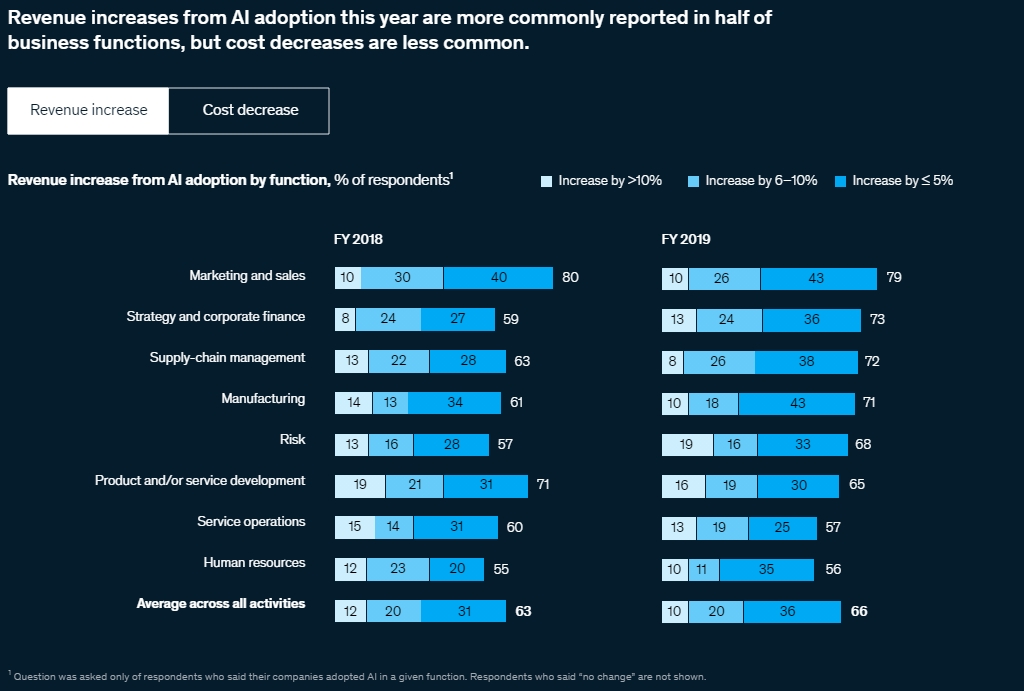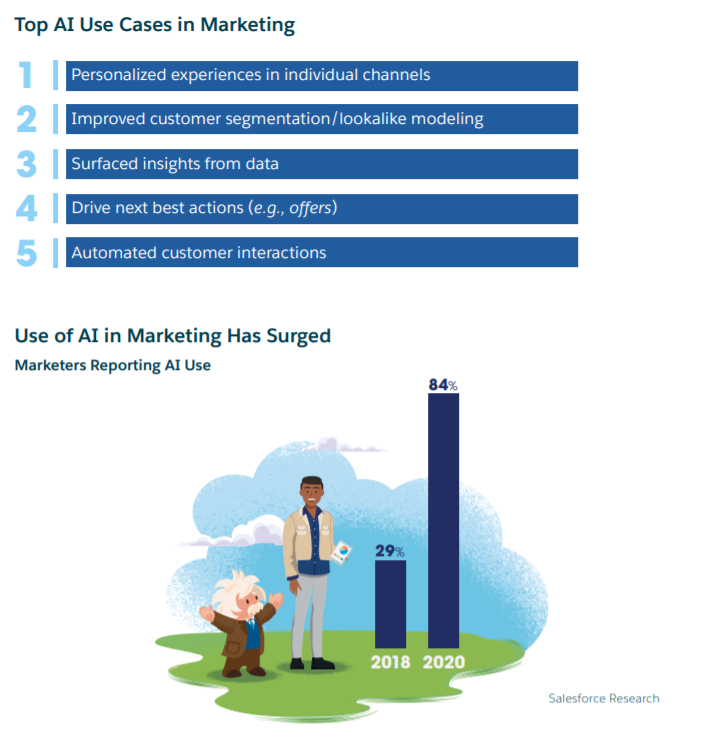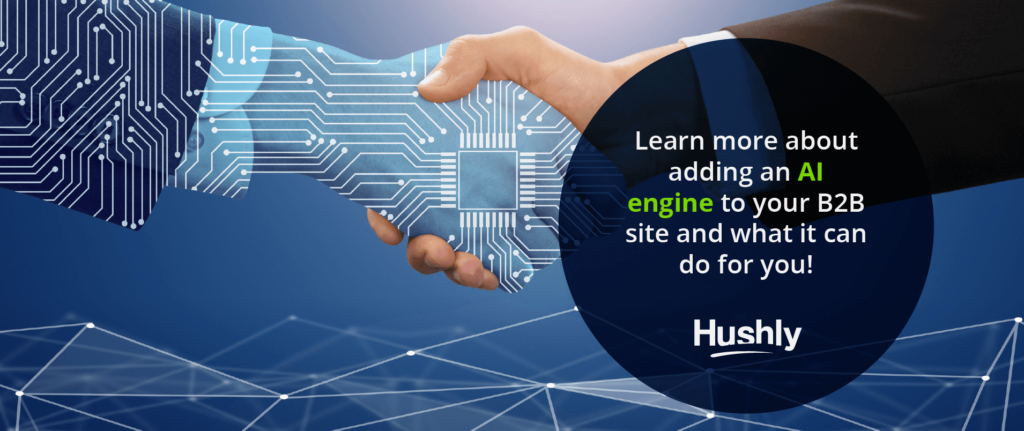AI is already used in many applications, including customer service, sales, and marketing. Gartner reported that in 2019, approximately 37% of enterprises had already begun implementing some form of AI into their business workflows, with predictions that 80% of emerging technologies will have AI foundations by 2021.
When it comes to B2B relationship building, implementing AI into your workflows can be extremely beneficial. However, there needs to be a careful balance between AI and your live, human touchpoints to assume your audience’s needs are being met.

How is AI Currently Being Used in B2B Relationship Management?
According to a survey by McKinsey Insights, approximately 50% of businesses surveyed stated that they had adopted AI in at least one business function, and of those that did, approximately 66% stated that they saw some level of revenue increase.

With so many businesses already using AI in some capacity, how much of it is actually being used in B2B relationship building?
Currently, AI is being used in several different ways when it comes to the B2B relationship-building process. AI is mostly used in the form of instant customer communication and appears in the form of real-time chatbots and automated customer interactions.
B2B marketing and sales teams are also using AI to help them hone in on their target audiences. This can be done by using AI to generate leads or by using algorithms to analyze the data generated when leads interact with the company.
AI is also used in the form of predictive analytics that can help businesses better understand the trends of their industries. This can be used to help businesses better predict their needs in the future and help drive next best actions during the customer journey.

Implementing AI into Your B2B Relationship Building
It’s easy to see why businesses are so excited about the prospect of implementing AI into their business models. It can help you automate your work and generate more leads that are more likely to convert.
However, when it comes to using AI in the B2B relationship-building process, there are some things to consider.
1. Make Sure Your AI Compliments Your Overall Business Goals
When implementing AI into your business, make sure that it’s done in a way that will complement your overall business goals.
For example, if you want to increase conversions on your website, you can implement an AI chatbot that can answer the most frequently asked customer questions. Depending on the questions asked and the answers given, the AI can then direct the individual to the right salesperson for more detailed information.
This way, you can increase the number of leads that convert while still providing a human touchpoint to help your prospects throughout the buying process.
2. Make Sure Your AI Isn’t Replacing Your Sales Team
When implementing AI into your business, make sure that your AI isn’t replacing your human sales team. Sure, AI can be an excellent relationship-building tool, but it is not a one-size-fits-all solution.
For example, if you use predictive analytics to help your sales team better understand their target audiences, it can help them better understand where they need to spend more time with a client. However, it can’t take the place of a live conversation with a sales rep.
Instead, use the AI-generated data to improve how you communicate with each new lead that enters your sales funnel. Once they’ve surpassed the general information that is supplied by your AI chatbots, it’s time to move them on to your live agents. That way, they can better customize the customer experience and ensure that each lead leaves the conversation feeling adequately educated and making a fully informed decision.
3. Use Your AI to Help Establish Long-Term Relationships
While AI can be used to generate leads and improve your sales funnel, it is also a great tool to help you establish long-term relationships with your customers.
AI chatbots are only one tool in your B2B relationship-building toolbox. Another excellent way to use AI is to use it in your email marketing campaigns. When it comes to your email campaigns, personalization is crucial. Not only is message personalization rated as the number one tactic used to increase engagement rates, but 99% of marketers say that it helps to advance customer relationships.
While it may be tempting to try and address each of your email subscribers individually, it’s simply not possible – especially if your email list is always growing.
Instead, by implementing AI into your email campaigns, you can set up different tailored messages for each action that subscribers take. All you have to do is define the actions and what fields need to be personalized. Once it’s all set up, you can sit back and let your AI do all the work for you. This way, you can still create that authentic human touchpoint and still have your AI send out the messages for you as each subscriber hits specific triggers.
Improve Your Lead Quality with Hushly’s AI Engine
When it comes to the B2B relationship-building process, implementing AI can be a great way to generate more leads, improve your sales funnel, and establish long-term relationships with your customers.
As more and more businesses begin to implement AI into their business models, it’s essential to keep in mind that it’s not something that should replace your live, human touchpoints. Instead, AI is a tool that can help you automate your workflows and generate more leads that are more likely to convert.
Hushly’s innovative customer-centric personalization platform improves lead quality by 59%. The AI-driven personalization lets consumers learn about our products on their own time while gently guiding them toward conversion.
This way, you’ll only be collecting the information from those interested in learning more, which will help improve your overall lead quality and engagement.
Learn more about adding an AI engine to your B2B site and what it can do for you!

